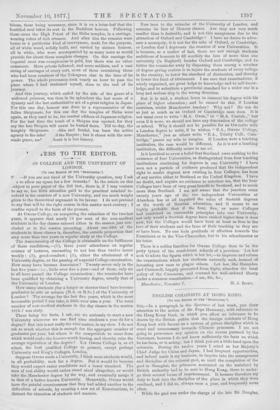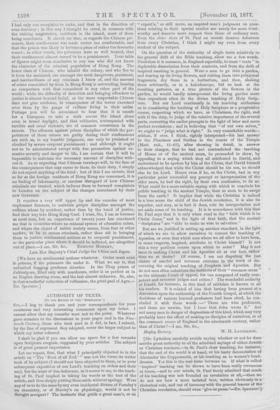ENGLISH COLONISTS AT HONG KONG. rro THE EDITOR OF THE
"SPEOTAT0R.1
Stn,—In a paragraph in the Spectator of last week, you draw attention to the action of Mr. Pope Hennessy, with reference to the Hong Kong Gaol, in which you allow an inference to be drawn by the British public that the foreign residents of Hong Kong look with favour on a system of prison discipline which is cruel and unnecessary towards Chinese prisoners. I am not going to pronounce any opinion on the course pursued by the Governor, because I do not know sufficiently the facts on which he has been, or is acting; but I think you are a little hard upon the colonists. During the twelve years I acted as her Majesty's Chief Judge for China and Japan, I had frequent opportunities, and indeed made it my business, to inquire into the management and discipline of the colonial gaol, as until the completion of the gaol in Shanghai, the prisoners sentenced on the mainland by British authority had to be sent to Hong Kong, there to under- go their several terms of imprisonment. It became therefore my duty to look into the discipline of the place in which they were confined, and I did so, always once a year, and frequently more often.
While the gaol was under the charge of the late Mr. Douglas, I had only one complaint to make, and that in the direction of over-leniency ; in this way I thought he erred, in common with the visiting magistrates, residents in the island, most of them being merchants. It struck me that, as regards the Chinese pri- soners, their confinement was made rather too comfortable, and that the prison was likely to become a place of rather too favourite resort ; in other words, the prisoners were so well treated, that their confinement almost ceased to be a punishment. Your table of figures might seem conclusive to any one who did not know the character of the criminal population of Hong Kong. The lower class of Chinese, who inhabit the colony, and who flee to it from the mainland, are amongst the most dangerous, persistent, and insubordinate of any criminals I know of, and the amount of crime committed by them in Hong Kong is astounding, bearing no comparison with that committed in any other part of the world ; while the difficulty of detection and bringing offenders to justice is almost beyond belief, as the more respectable Chinese dare not give evidence, in consequence of the terror exercised over them by the gangs of ruffians living in their midst. Perhaps you will be astonished to hear that it is unsafe for a European to take a walk across the island alone even in broad daylight, and that robberies, accompanied with terrible and cruel violence, are of common occurrence in the streets. The offences against prison discipline of which the per- petrators of these crimes are guilty during their confinement are such as, in my humble judgment, can only be punished or checked by severe corporal punishment ; and although it ought not to be administered except with duo precaution against ex- cessive severity and danger to life, I am certain that it will be impossible to maintain the necessary amount of discipline with- out it. As to expecting that Chinese turnkeys will, in the face of the consequences that may ensue to them, do their duty, I simply do not expect anything of the kind ; but of this I am certain, that so far as the foreign residents of Hong Kong are concerned, it is no feeling of inhumanity, or careless disregard of how Chinese criminals are treated, which induces them to forward complaints to London on the subject of the changes introduced by their new Governor.
It requires a very stiff upper lip and the exercise of most unpleasant firmness, to maintain proper discipline amongst the ruffians whom by accident, rather than by the hand of justice, find their way into Hong Kong Gaol. I trust, Sir, I am as humane as most men, but an experience of twenty years has convinced me that in countries where no rational system of education exists, and where the object of native society seems, from fear or other motive, to be to screen criminals, rather than aid in bringing them to justice, sentimental notions as to corporal punishment, or the particular place where it should be inflicted, are altogether
out of place.—I am, Sir, &c., EDMUND HORNEY,
Late Her Majesty's Chief Judge for China and Japan.
[We have no sentimental notions whatever. Order must exist in prisons, if the prisoners die under it. What we say is, that unlimited flogging produces disorder. In the Thug prison of Jubbulpore, filled only with murderers, order is as perfect as in an English drawing-room, and the lash almost unknown. So, also, in thatmonderful collection of ruffianism, the great gaol of Agra.— En. Spectator.]







































 Previous page
Previous page